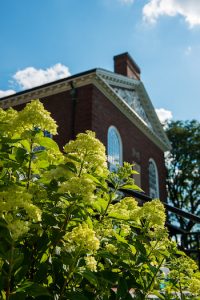 A virtual Convocation officially kicked off the 2020–2021 school year on Tuesday, with Milton students joining from all over the world to hear School leaders’ vision for the year.
A virtual Convocation officially kicked off the 2020–2021 school year on Tuesday, with Milton students joining from all over the world to hear School leaders’ vision for the year.
The event, a longstanding Milton tradition, provided co-head monitors Eliza Dunn ’21 and Garvin McLaughlin ’21 their first opportunity to formally address the Upper School. Students also heard remarks from Head of School Todd Bland, Upper School Principal David Ball, Director of Spirituality and Community Development Suzanne DeBuhr, Dean of Students José Ruiz, and Director of Equity Vanessa Cohen Gibbons, and introductions from new members of the faculty.
Dunn, who spent her summer working as a lifeguard, said watching people learn to swim provided a helpful lesson in managing the uncertainty of the COVID-19 pandemic and the devastation of racial injustice. She encouraged her classmates to not just expect the unexpected, but to embrace it.
“Sometimes, the only way to conquer the scary and unknown is to take a deep breath, plug your nose, and jump,” Dunn said. “In the face of uncertainty, it’s easy to be paralyzed. It’s safer to stay on land, but to do that would be to miss the opportunity. It’s time to jump in.”
The speakers emphasized the importance of beginning the year with a commitment to one another and a willingness to learn and grow.
“We must acknowledge the power of joining together,” this year, even in virtual forums, Ball said in his opening remarks. He and Bland affirmed the School’s commitment to building an anti-racist, equitable community. This may be an ugly time in American history, Bland said, but if Milton embraces growth, there is the promise of a beautiful future.
McLaughlin, who is in his 13th year as a Milton student, said he has missed his “home” since remote learning began. He urged students to confront the challenges facing the world and the School community head-on.
“It’s so crucial that we listen to each other. If we listen to, accept, and forgive one another, we can create a culture here at Milton that inspires change.” he said. “I have something to learn from each person here, and the only way I can do that is to listen. Kindness and dedication to one another can stretch over any distance.”
Cohen Gibbons outlined Milton’s vision for an anti-racist community by saying, “Anti-racism, like community, isn’t just a word, it’s a promise. Anti-racism honors the complete humanity of all people, and it holds as a foundational principle that all of us are equally capable… People do not need to be ‘fixed’ to succeed in a system. The system needs to change—to be broken down and built anew—so that everyone can experience justice.
“Milton, this is our task: We are not anti-racist because people of color need help,” she continued. “We are are anti-racist because we all deserve to be free.”